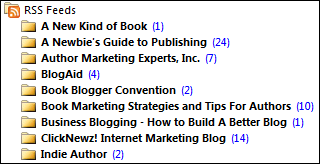Guest Expert: Dana Lynn Smith
As book authors, we need to learn about a number of topics on an ongoing basis:
- the craft of writing
- our book topic or genre
- the publishing business
- our target audiences
- how to promote books
Here are five free and easy ways to stay up to date and expand your knowledge as a savvy author:
1. Subscribe to the top blogs in your areas of interest.
It’s not easy to remember to visit blogs on a regular basis, but there are several ways to get notification of new posts on your favorite blogs. When you subscribe to a blog’s RSS feed, you will get each new post delivered to your email inbox, to your RSS folder in the Outlook email program, or to a feed reader. Some blogs feeds are also available on Kindle for 99 cents to $1.99 a month.
Look for the subscription area on your favorite blogs, usually marked by an orange feed icon like this:
![]()
Click on the orange icon or “subscribe in a reader” link and you will see a box like this:

Just choose a feed reader from the list, or click the second link to subscribe by email, or click on “View Feed XML” and select “Outlook” to subscribe via the RSS folder in Microsoft Outlook.
I subscribe to 27 publishing and marketing blogs through Outlook. While I certainly don’t have time to read every post on those blogs, I do skim down the list and read those articles that are of the most interest to me. (Remember my article about the importance of good headlines in blog posts?). Here’s what my RSS Feeds folder looks like in Outlook:

2. Use Google Alerts.
Google Alerts are a great way to keep up with your topics of interest and to monitor what’s being published online about you and your books. When you set up alerts to search for specific keywords, you are notified via email or RSS feed each time something appears online related to those keywords. Here are some helpful resources:
8 Ways Nonfiction Authors Can Use Google Alerts by Stephanie Chandler
How to Get Alerts Delivered by RSS feed Instead of Email
Google Reader and Persistent Search by Dave Fleet shows how to set up alerts and receive them through the Google feed reader.
3. Subscribe to newsletters.
Many experts publish a free online newsletter filled with industry insights and tips. Often they offer a free report or ebook as a gift for signing up for the ezine. Novelists may want to subscribe to the newsletters of other authors who write in their genre. Look in the sidebar of blogs for a newsletter signup form.
4. Follow experts and authors on social networks.
I follow more than 200 publishing and marketing experts on Twitter, Facebook and LinkedIn. I learn a lot by reading their posts and I share my favorite posts with my own followers. To connect with your fellow authors and experts, look for the familiar social network icons on blogs and websites that you visit (and don’t forget to put those icons on your own sites.)
5. Attendee free teleseminars and webinars.
As you follow experts in the areas you need to learn about, you will probably get invited to free teleseminars and webinars. When an educational program is offered at no charge, there’s usually a sales pitch for a product or service, but the best teleseminars also offer a lot of helpful content at no charge.
Regardless of which methods you choose for your continuing education as an author, never stop learning!

Dana Lynn Smith, The Savvy Book Marketer, helps authors and indie publishers learn how to sell more books through her how-to guides, blog, newsletter, and private coaching. Learn more about promoting your books by subscribing to her blog, following @BookMarketer on Twitter, and connecting on Facebook.



